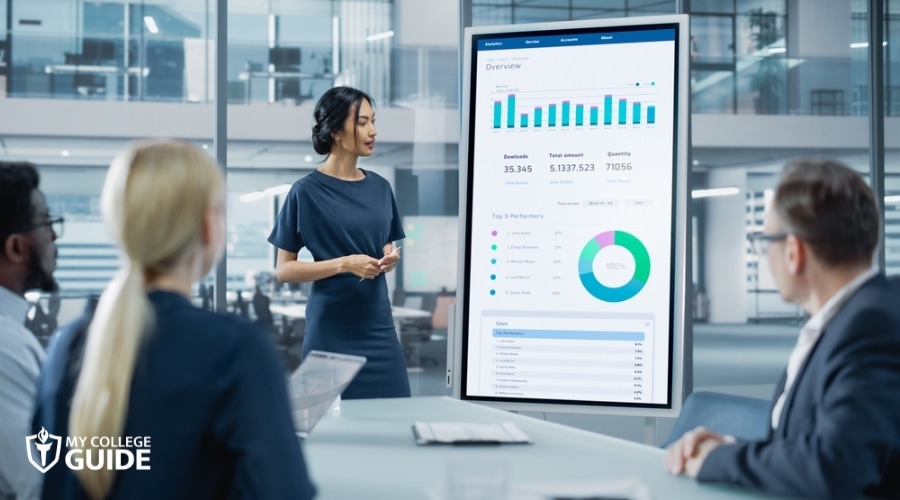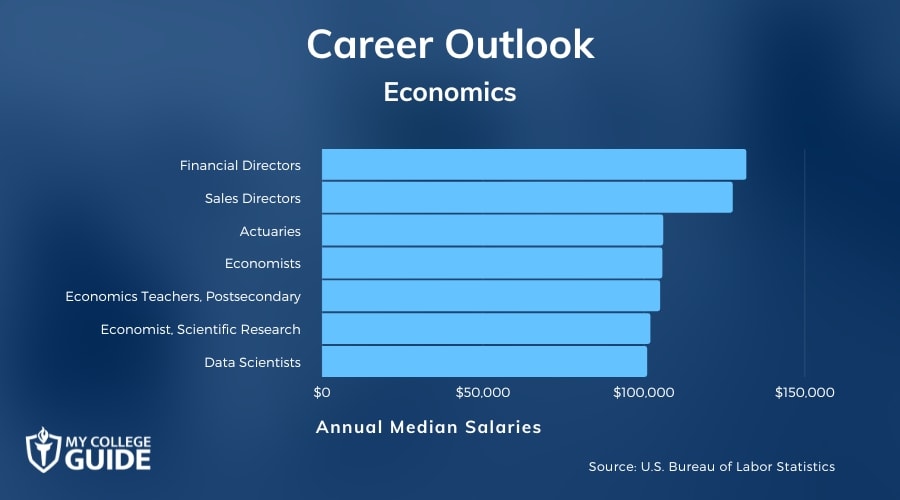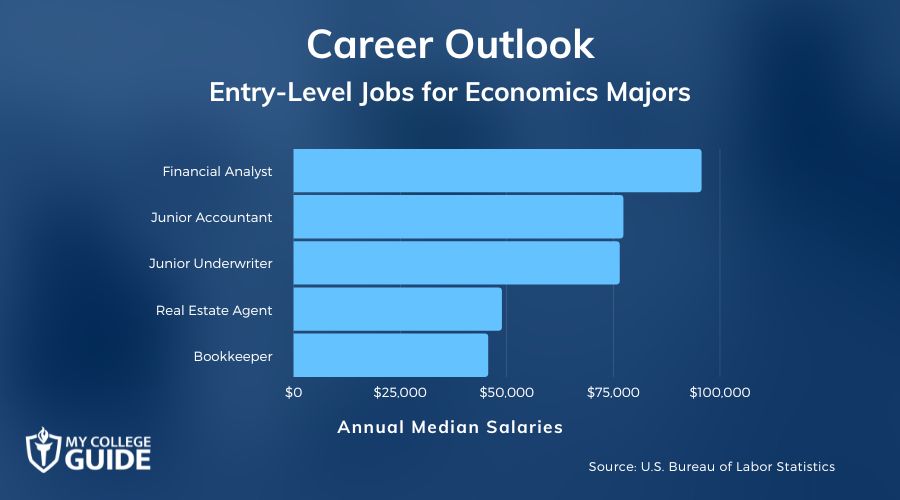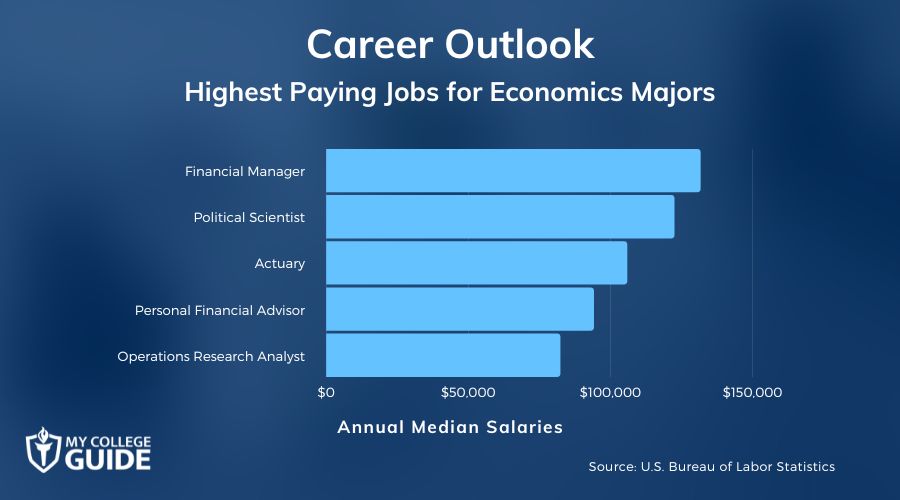For those that enjoy the challenges of working with data and numbers, researching economics careers can open the door to a number of fast-paced business careers.

From sales and marketing to financial planning and management, if you’re wondering what can you do with a degree in economics, rest assured that the skills learned in an economics degree program are sought after in a variety of professional industries.
Editorial Listing ShortCode:
Pursuing an economics degree is a great way to kick-start your career and use your math, research, and analytical skills.
What Can You Do With an Economics Degree?

When debating what to do with an economics degree, it’s helpful to keep in mind that much like with careers in education or culinary careers, the career fields related to economics are expansive and diverse.
Whether you enjoy working on the financial end of the industry or would like to work within direct sales and marketing, there are a number of professional economics careers that will help you achieve your long-term goals.
Editorial Listing ShortCode:
Those who graduate from an economics degree program often begin working in entry-level business or sales positions. Entry-level positions include various career paths like a financial analyst, as you build your career, you may decide to become a personal financial advisor.
If you prefer to help companies manage their finances, you can look into becoming a finance manager. While these career ideas typically offer annual wages on par with the national average according to the U.S. Bureau of Labor Statistics (BLS), you may be able to work your way up the corporate ladder to high-level management positions and top salaries.
10 Things You Can Do with a Degree in Economics
Having an aptitude for numbers, trends, and analytics is one thing, but you may be wondering “what can I do with an economics degree?”
In fact, there are many careers for economics degree holders and most show impressive projected job growth over the next 10 years per data from the U.S. Bureau of Labor Statistics.
1. Economist

Education Requirement: Master’s degree
Projected Job Growth: 6%
This is likely the first job that comes to mind when you start brainstorming econ major careers, but it’s not your only option.
Economists continuously monitor global economic trends while analyzing a variety of factors that can impact or are impacted by the economy. They may work in government roles, for large businesses, or for news media outlets.
2. Financial Manager

Education Requirement: Bachelor’s degree
Projected Job Growth: 17%
Financial managers work with companies and business owners to help plan strategic expansion. They are able to review spending, costs, and profit to provide recommendations that can increase profit.
Financial managers often have a background as financial analysts and can evaluate investments and stock performance as part of their role. With this data, they are able to review and forecast trends that can impact a company’s expansion.
3. Accountant

Education Requirement: Bachelor’s degree
Projected Job Growth: 6%
Accountants may work with individuals or businesses to help them keep their financial records in order. They may monitor spending and income, coordinate taxes and tax payments, and perform risk analysis when considering a pricey investment.
In some cases, accountants can provide their clients with an analysis of their spending to help them make choices about how their money is being used.
4. Market Research Analyst

Education Requirement: Bachelor’s degree
Projected Job Growth: 19%
Market researchers are responsible for providing business owners with input on how their products or services will sell. To do this, they analyze current trends, spending habits, demographics, and existing products, and research historical sales and offerings.
Typically, clients will be start-up businesses, small business owners, or even large businesses that are looking to introduce a new line of products or services.
5. Statisticians

Education Requirement: Master’s degree
Projected Job Growth: 31%
Statisticians typically review facts and figures to mathematically determine the likelihood of success and potential solutions. Economic statisticians are tasked with calculating how certain groups or communities are impacted by and participate in the economy.
Editorial Listing ShortCode:
Frequently, statisticians conduct their own research, including population surveys and historical records reviews as well as report their findings to business owners or government groups.
6. Policy Analyst

Education Requirement: Master’s degree
Projected Job Growth: 6%
Policy analysts often look at current data, historical trends, and statistical analysis to determine if a specific policy is performing well. They may make recommendations based on their findings, as well as share data regarding policy impact.
These professionals typically work in government roles and may pursue additional education in law to help them with their duties.
7. Budget Analyst

Education Requirement: Bachelor’s degree
Projected Job Growth: 3%
Budget analysts are commonly found as members of project teams. As projects are introduced, budget analysts review proposals and calculate spending and possible return on investment.
These professionals are skilled at conducting cost-benefit analyses and presenting their findings to project owners and stakes holders. Frequently, they are asked to provide recommendations to help projects become successful.
8. Management Consultant

Education Requirement: Bachelor’s degree
Projected Job Growth: 11%
Management consultants are professional strategists who can help businesses learn to run efficiently. They review productivity, policy, engagement, and efficiency to determine where business owners can make different choices.
They may make recommendations and present opportunities to leaders that will increase productivity and allow the business to thrive. To do this, they must review, research, and analyze data from each department and group.
9. Actuary

Education Requirement: Bachelor’s degree
Projected Job Growth: 21%
Actuaries are typically employed by financial, information technology, or insurance-related businesses. They are specifically tasked with calculating and assessing risk related to business decisions.
These professionals research and analyze risk potential. They present their findings to business owners and leaders and make recommendations regarding the least-risky options and opportunities available.
10. Data Scientist

Education Requirement: Bachelor’s degree
Projected Job Growth: 36%
The Bureau of Labor Statistics projects that the demand for data scientists will increase rapidly in the next ten years.
Data scientists are helpful in nearly every business, from retail to healthcare, to software development, and beyond. These professionals build programs and sort through information to help solve problems, answer questions, and anticipate business-related challenges.
Editorial Listing ShortCode:
When searching for careers with an economics degree, you may wish to consider how the skills obtained throughout the degree program can be beneficial to a variety of career paths, beyond the traditional role of an economist.
Economics Careers & Salaries

To help you understand the different economics major careers available after you graduate with an economics degree, we have put together a list of the top 40 economics careers & salaries based on data from the U.S. Bureau of Labor Statistics (BLS):
| Careers | Annual Median Salaries |
| Financial Directors | $131,710 |
| Sales Directors | $127,490 |
| Actuaries | $105,900 |
| Economists | $105,630 |
| Economics Teachers, Postsecondary | $104,940 |
| Economist, Scientific Research and Development Services | $101,910 |
| Data Scientists | $100,910 |
| Financial Risk Specialists | $100,000 |
| Budget Analysts, Professional, Scientific, and Technical Services | $98,030 |
| Operations Managers | $97,970 |
| Finance Professors | $94,360 |
| Personal Investment Advisers | $94,170 |
| Business Analysts | $93,000 |
| Corporate Financial Analysts | $91,580 |
| Financial Examiners, Management Of Companies and Enterprises | $90,101 |
| Operations Research Analysts | $82,360 |
| Pension Examiners | $81,410 |
| Cost Estimators, Heavy and Civil Engineering Construction | $80,510 |
| Budget Analysts | $79,940 |
| Operation Research Analysts, Finance and Insurance | $79,450 |
| Logisticians, Manufacturing | $77,740 |
| Budget Analysts, Local Government | $77,320 |
| Financial Specialists | $77,300 |
| Cost Accountants | $77,250 |
| Logisticians | $77,030 |
| Market Research Analysts, Finance and Insurance | $76,650 |
| Insurance Underwriters | $76,390 |
| Business Operations Specialists | $76,040 |
| Cost Estimators | $65,170 |
| Market Research Analysts | $63,920 |
| Commercial Lenders | $63,380 |
| Loan Officers | $63,380 |
| Stock Brokers | $62,910 |
| Executive Assistants | $62,060 |
| Survey Researchers | $59,740 |
| Economist Research Assistants | $49,720 |
| Data Analysis Assistants | $48,160 |
| Debt Management Counselors | $47,580 |
| Financial Operations Clerks | $46,900 |
| Commercial Tellers | $36,310 |
Our nation’s society and economic environment are constantly evolving, and careers for economics majors are in high demand throughout a variety of industries. Whether you specialize in finances or sales, your economic skills can be an excellent tool for securing professional employment in the future.
The BLS reports that those working as an economist can expect to see 6% occupational growth over the next decade. For those interested in working as market research analysts or financial advisors, it is projected that these careers will see 19% and 15% growth respectively during this same timeframe.
Editorial Listing ShortCode:
When you are seeking an expansive education that covers essential skills needed in the modern business world, an economics degree may be the perfect place to start as the economics career outlook continues to look positive.
Whether you want to translate your skills into research, management, sales, or finances, the knowledge gained through this degree program can open the door to a number of exciting professional economics jobs.
How to Know if a Degree in Economics is Right for Me

Not every major is a great fit for every student, so how do you know if a degree in economics is the best path for you?
Here are a few things you can ask yourself to determine if an econ major is a good choice:
- Are you interested in carefully reviewing, analyzing, and interpreting large quantities of data? Economics majors are skilled in researching patterns, policies, problems, and practices through data analytics.
- Do you consider yourself a strong problem solver? Economics majors are often tasked with finding a solution or making recommendations to existing situations once their research is complete.
- How are your math skills? In addition to research and analysis, economics majors calculate statistical probability, risk, and market trends, and forecast profit and loss margins.
- Will a degree in economics be helpful in your preferred career path? Critical thinking, problem solving, analysis, and noticing trends can be helpful skills for a variety of professionals, but may not be a perfect fit for every job.
Economy majors have a unique opportunity to observe and analyze the world around them through consumer behavior, supply and demand theory, policy, and finance, which can be helpful in a variety of professional situations.
Economics Licensure and Certifications

Some economics majors’ careers involve obtaining certain licenses or certifications, but these are not always required by every employer or state.
Those who wish to become actuaries, for example, may wish to receive additional professional certifications from the Casualty Actuarial Society or the Society of Actuaries (SOA). A professional researcher certification (PRC), is a popular choice among those who are interested in careers as market research analysts or economists.
A Chartered Financial Analyst (CFA) certification can also be useful for those planning to work in finance-driven professions, such as accounting, financial management, and budget analytics.
Is Financial Aid Available?

There may be a variety of financial aid opportunities available for economics majors. Those who are interested in needs-based educational assistance may wish to complete the Free Application for Federal Student Aid (FAFSA). This program provides loans at the federal level.
Editorial Listing ShortCode:
The school you choose may also offer scholarships or grants. The details for availability and eligibility are often found by inquiring with admissions representatives. Additionally, you may find local opportunities, such as private scholarships, employer tuition reimbursement programs, and grants offered by professional organizations.
What Is an Economics Degree?

An economics degree is a degree program that teaches students the analytical and mathematical points of economics.
Economics degrees are offered at several different degree levels, but most students begin their education with a bachelor’s degree program. From there, students can go on to earn a graduate degree that offers specialized skills within their economic interests.
Overall, the main focus of your economics classes will be to help you learn how to view business and society from an analytical and mathematical point of view for future economics degree jobs. Throughout the course of your education, you will likely take a number of courses that cover the following topics:
- Market trend forecasting
- Management and leadership skills
- Analysis and interpretation of data
- Financial econometrics
- Law and economics
With the variety of skills taught throughout an economics degree program, you will be able to find employment in a number of industries including business management, operations research, and financial analysis.
If you need a greater level of flexibility than the traditional college education provides, look into the innovative options available through online economics degrees.
Many accredited universities are now offering economics degrees through virtual platforms that can help adult students juggle the demands of career and family obligations, which can help them achieve their goals toward various economics major jobs.
Is Economics a Good Major?

Yes, economics is a good major for many undergraduate students. Equal parts finance, mathematics, social behavior, and global analytics, this major can be fascinating for many students. There are many potential careers for economics degree holders.
Editorial Listing ShortCode:
Some choose to become economists, but other graduates choose jobs in adjacent fields, such as accounting, actuarial, financial, and analytical fields. According to the Bureau of Labor Statistics, several potential economics majors’ careers are experiencing tremendous growth, including actuaries, statisticians, and data scientists, which may be intriguing for hopeful econ majors.
What Skills Do You Learn in Economics?

One reason there are so many answers to the question “ what can economics majors do?” is because the skills included with this major are valuable to many career options.
Generally speaking, econ majors will practice skills such as:
- Data analysis and critical thinking
- Mathematical formulas and calculating statistics
- Clear communication with business owners and stakeholders
- Researching and writing reports
These skills are beneficial for many professionals and can help econ majors find their ideal career paths.
Where Do Economics Professionals Work?

Economics majors’ careers can take them to a variety of workplace settings, thanks to the wide array of skills they possess. Economics professionals can be found in areas such as:
- Banks and other financial institutions
- Government and political offices
- Insurance companies
- Private or publicly-traded businesses
Some individuals who have graduated with economics degrees work at a private practice, or as consultants who work for clients on a contractual basis, while others are employed full-time by an organization or business.
How Much Does an Economist Make?

When searching for careers with an economics degree, you may be interested in how much you can make. The BLS indicates that economists have a median annual salary of $105,630, and actuaries have a similar median annual salary of $105,900.
Mathematicians and statisticians may experience similar earnings to financial analysts, with the former reporting a median annual salary of $96,280, and the latter $95,570. Note that salary is often related to a variety of conditions, such as experience, location, and employer.
What Do Economists Do?

Economists research the correlation between social behaviors, resources, production or output, and consumption. They may study small groups like communities or certain demographics, or they may analyze data on a global scale.
They review theories such as supply and demand, as well as how social trends can impact buying and use of goods. They forecast changes and analyze how policy can impact spending. They may make recommendations for resource distribution. Economists also analyze situations like market fluctuation, inflation, and unemployment to determine if changes are advisable, and what those changes may look like.
What Are Some Entry-Level Jobs for Economics Majors?

Upon graduation, you may be in the market for entry-level econ major careers to help you gain experience. Here are some entry-level job options for economics majors, as well as their median annual salary, according to the Bureau of Labor Statistics:
- Bookkeeper: $45,560
- Junior Underwriter: $76,390
- Junior Accountant: $77,250
- Financial Analyst: $95,570
- Real Estate Agent: $48,770
Entry-level careers can prepare economics majors for a long-term career, as the experience can provide you with greater insight into your chosen field.
What Are the Highest Paying Jobs for Economics Majors?

Along with wondering what can economics majors do, you may be interested in careers that provide a larger paycheck. The Bureau of Labor Statistics lists these as some of the highest median annual salaries for economics majors:
- Financial Manager: $131,710
- Political Scientist: $122,510
- Actuary: $105,900
- Personal Financial Advisor: $94,170
- Operations Research Analyst: $82,360
Keep in mind that these jobs are often held by those with significant experience, and may require additional education beyond a bachelor’s in economics.
What’s the Difference Between a Finance vs. Economics Major?
There are many areas in which finance and economics overlap, especially in a collegiate course of study. It’s a good idea to consider each option carefully when planning your educational goals.
| Finance | Economics |
|
|
While students of each major may be asked to take courses in both areas, the degrees are often separate to allow for greater concentration.
Is an Economics Degree Worth It?

Yes, an economics degree is worth it for many professionals. There are many fields in which a professional can benefit from the skills earned in pursuit of an economics degree.
Furthermore, there are a variety of employment fields for those who are passionate about economics, analytics, business practices, and policies. They may become analysts, accountants, and actuaries, work as consultants, or hold roles within local, state, and Federal government.
Editorial Listing ShortCode:
The BLS reports a continued increase in job growth for those with an economics degree as financial advisors are expected to see a 15% job growth over the next 10 years and economists will enjoy a 6% growth rate. Being able to critically analyze and interpret large amounts of data is an important task in many careers, which can make the pursuit of an economics degree useful for many individuals.
Getting Your Economics Degree Online

If your concerns about “what can I do with an economics degree” are holding you back from earning your economics degree online, it may be time to look deeper.
Earning your economics degree online may be the first step for many students who are interested in pursuing a career that requires deep analytical skills and research, as well as understanding and interpreting various behaviors.
The first step on your career path might be graduating with an economics major, so take a look at some of the accredited programs offered to determine which might be helpful for your long-term professional and educational goals.
